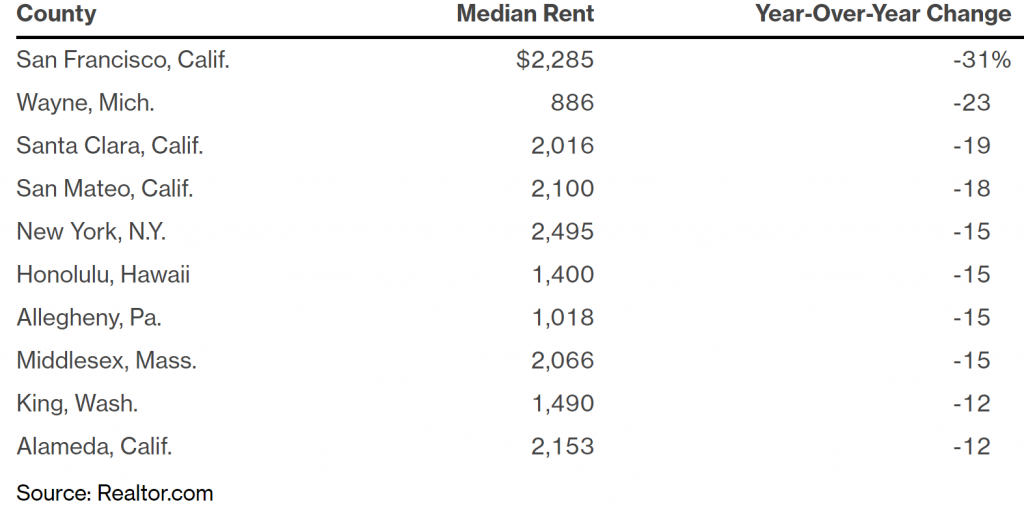
San Francisco, Bay Area Rents Plummet Due To Space Concerns, COVID-19
Bay area rents have gone down as much as 31% in the past year
By Evan Symon, October 14, 2020 2:09 am
On Tuesday, reports by several realtor and rent-tracking companies found that San Francisco has seen overall rent prices drop by up to 31% since September of 2019, with other Bay area locations also seeing significant drops in rent prices.
According to a Realtor.com study, the average price for a studio apartment in San Francisco fell by 31% to $2,285 a month, a large fall compared to the 0.5% average decline nationwide. Three of the top five counties on the list were from the Bay area, with Santa Clara County and San Mateo County also seeing drops of close to 20%. Alameda County was also in the top 10 with a 12% drop.

A Zumper National Rent Report also found that rent drops are hitting larger apartment as well, with one bedroom apartments falling by at least 20% throughout the city.
The rent drops have been largely due to the COVID-19 lockdown forcing many people to stay at home, with many finding that they want extra room that apartments in suburbs or even cities farther away can provide. Many have also left because of rents simply being too high.
“Before the coronavirus, we had people not minding smaller apartments because of the great area they were in,” noted San Francisco realtor Patricia Hayes-Faber, to the Globe. “But during the virus, so many began working from home, especially tech sector workers. They were now in these small apartments all day, and they couldn’t leave to go to the shops or restaurants around them because they were all closed.
“And that’s when more and more went on the market. Everyone I asked was heading out to Stockton, across the Bay or more south. A few said they were going to LA because it was cheaper there. Imagine that.
“So rents have been going down since then, and are showing no signs of stopping. A lot of these firms that bought these places up during the boom are now panicking because they aren’t getting the desired return on investment. And as more and more leases end, we’re going to see more apartments for cheaper prices.
“If the pandemic goes on for awhile, and people don’t returns to offices right away or places don’t open up, parts of San Francisco can be cheap-ish again. And right now we’re seeing skyrocketing costs of places in Texas, Oklahoma, and elsewhere, so people are being discouraged enough to not move too far out – I’ve had so many clients say they wouldn’t be caught dead in Texas. But we’re going to be seeing a cheaper San Francisco when this is all over, which may bring another boom.”
Political rent shifts in 2020
The shift of rents is also playing havoc with elections this year, as many neighboring areas are seeing a new, generally Democratic-leaning group of voters come in. Some Congressional districts, such as the 4th district, are seeing closer races than usual due to voter influx. Meanwhile, majority Democrat cities themselves are seeing a slight bump in Republican percentages as they have been less likely to move.
“There aren’t a lot of Republican here,” said San Francisco apartment renovator Joel Rourke to the Globe. “But a lot of business we’ve had since COVID-19 has been people who said they were Republican or implied that they voted that way. Five years ago, it was all Democrats who were calling me. But many of them have been leaving. And the people who have been staying are generally wealthier and more Republican. A lot of real estate agents and apartment owners I work with mentioned this too.
“I mean, the city is still very much Democratic. But wouldn’t it be wild if the city starts to go the other way?”
However, despite the large drops, San Francisco still leads the nation in the most expensive one-room bedroom apartments, with the median being priced at $2,830.
- Bill to Require Law Enforcement Disclosure if AI Was Used To Help Write Reports - August 7, 2025
- Gov. Newsom Files FOIA Request To ‘Expose True Cost’ Of L.A. Federal Troop Deployment for Anti-ICE Riots - August 6, 2025
- California Redistricting: How Newsom’s Plan Will Demolish Hard Fought GOP Gains - August 6, 2025




